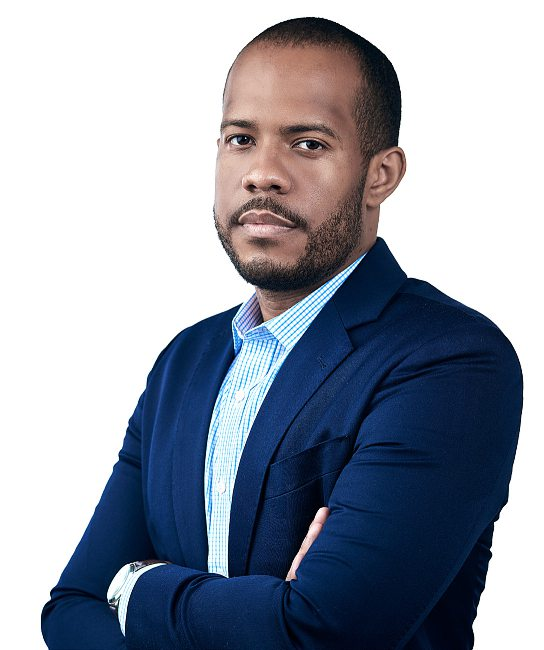Mbembo Bemba
«Mining has a bright outlook»
Regional Director of FirstBank DRC
In mid-October 2023, Mbembo Bemba, FirstBank regional director in Lubumbashi, Democratic Republic of Congo, attended the first Nigeria Mining Week in Abuja. He shared his thoughts with us.
AM: Why did you come to Abuja?

Mbembo Bemba: To participate in the first Nigeria Mining Week, sponsored by FirstBank, which I work for in Lubumbashi, Democratic Republic of Congo. I’m the regional director for Grand Katanga, a mostly mining area with a lot of copper and cobalt. Our mining finance experience is well known. I came here to share my expertise with Nigeria, which is gradually taking back control of its mines.
Nigeria’s once thriving mining industry was long left fallow. Why?
Nigeria is bursting with mineral resources, including strategic ores like lithium, which is widely used to make electric vehicle batteries. It also has tin, tantalum, bitumen, coal, etc. The country was highly focused on this market until the 1940s. It ranked among the world’s leading tin producers. When oil was discovered in the 1950s, mining was abandoned and the economy revolved around oil alone. But the past five years have seen a drive to diversify the economy and develop other industries as well as agriculture. Quite significant developments have taken place in the gold and lithium sectors. Many surveys were carried out and some exports have begun. As a financial institution, it’s important for us to take part in a forum like this one in order to address certain issues and challenges and exchange views with market players to see how to position ourselves on a growing market. FirstBank has far-reaching ambitions in the mining industry.
How are mining projects financed?
There are several stages. The first is prospecting and exploration. It’s a bit of a gamble because you can’t be 100% sure of the resources you’ll find. Participating at this stage is complicated for a financial institution because it’s conducted on an equity basis. Once reserves have been proven, financing can be sought and funds raised, especially for the construction stage, which requires the most medium to long-term financing because building a mining plant takes time.
How much time?
It depends on the ore, the size and the capacity. The period can range from 12 to 24 months. During this time, it’s all spending with no revenue coming in. Financing usually comes from the operating entity’s capital, from the financing sector, i.e., banks willing to take on the risk, depending on the guarantees put in place by the operating entity, the company’s track record, proven or unproven experience, etc. In recent years, more and more institutions and development banks, like the Africa Finance Corporation (AFC), International Finance Corporation (IFC), AfreximBank and the World Bank, have also participated.
What kind of investors are entering Nigeria’s mining industry today? Are they local or foreign? Which ores are in demand?
There’s interest from both local companies and international players. Tesla, for example, is interested in Nigerian lithium. It’s looking for alternatives to cobalt, whose price has steeply risen and whose global reserves are limited. Gold is also attractive, even though most deposits are in high-risk areas in the northern part of the country, where some mines have opened.
President Tinubu wants to diversify the economy and promote mining, but are there still development hurdles, and if so, what are they?
The debate is over the regulatory framework and the difference between the federal and local governments. Mining resources belong to the federal government, but mining sites depend on local authorities, which sometimes causes political or other friction. A long-awaited mapping system should be put in place. Lastly, I think the focus should be on more in-depth searches to find out where the resources are, what the approximate reserves are and what their grade is. This could be an incentive for some national and international investors to become involved.
What do you think of the industry’s short and medium-term outlook?
There’s real excitement and high ambition. The first Nigeria Mining Week took place in Abuja this year, and our country has an increasingly large presence at South Africa’s Mining Indaba forum. I’m quite optimistic. There are large reserves and good grades. When you see how the country has developed, based solely on oil production, it’s safe to assume that if mining is added into the mix we’ll have a bright future ahead of us.
|
Segilola Gold, the first industrial scale project Production, which began in late 2021, reflects the resurgence of foreign investors’ interest in gold. In 2016, Canada’s Thor Exploitations acquired the Segilola gold project in Osun, 120 kilometres from Lagos. After the drilling, pre-feasibility, feasibility, financing, procurement and construction stages, which took five years, Nigeria’s first industrial-scale gold mine entered into operation at the end of 2021. In 2022, its first full year of operation, Segilola produced 98,000 ounces of gold. It employs 1,600 people, 90% of whom are Nigerian. Of those, 26% come from local communities. The growing Segilola project is held up as an example of the will to diversify the country’s resources, especially by developing the mining industry, which had been left unattended since the discovery of oil. The mine’s initial lifespan being relatively short (five and a half years), Thor Exploitations has already identified several high-grade mineralized vein systems within a 50-kilometre radius. Head of operations James Philip says Nigeria has a solid, eager, well-trained workforce and a stable political landscape. The only drawback is the lack or dilapidation of infrastructure. “Clogged ports, poor roads and lack of power are stumbling blocks,” Mr. Philip adds. However, he is delighted with the new impetus that the Tinubu government has decided to give the industry. “The mining law is progressive and clearly aims to establish an environment favourable to its development,’ he says. “The ministry is working on resolving a number of ambiguous situations to improve the interface FITZ between financial and tax legislation.” |